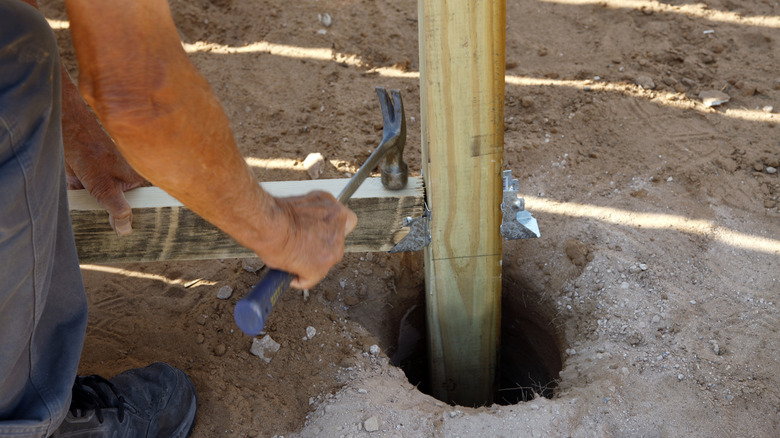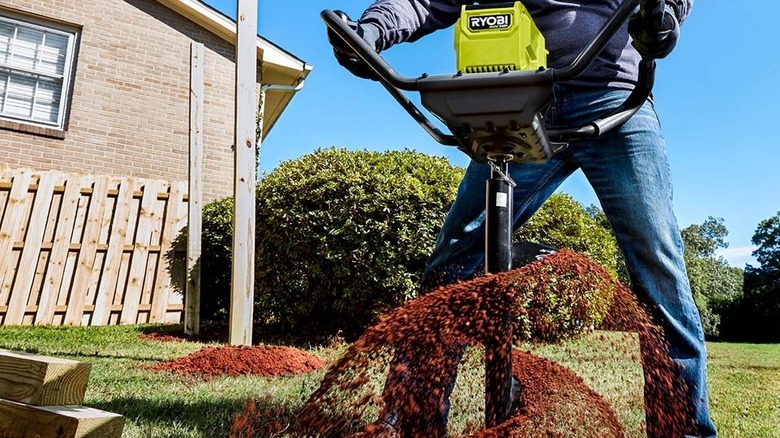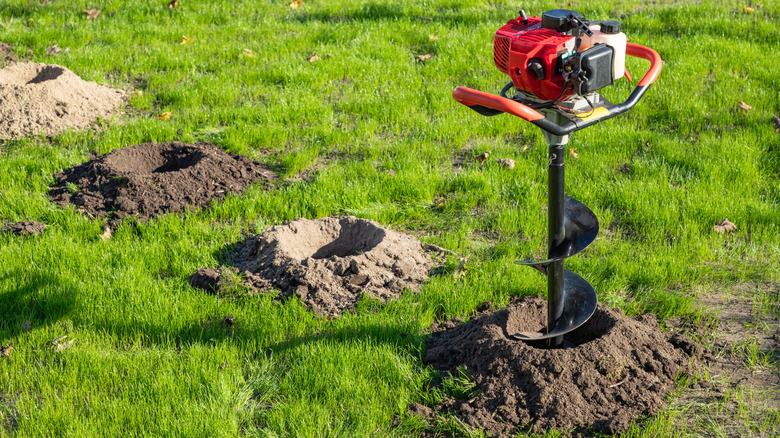Ryobi's Auger May Be Convenient, But Is It The Right Tool For The Job?
We may receive a commission on purchases made from links.
Fences can be used to create different areas in your yard, increase your privacy, and instantly boost curb appeal. If you want them to stay up, most will need posts sunk well into the ground. The same is true if you're installing uprights for a gazebo or other garden structure. The best tool for digging post holes is undoubtedly an auger. Ryobi's battery-powered 40V 8-Inch Earth Auger promises cordless convenience and eco-friendliness while claiming to deliver more power than a 52cc gas alternative. It's a bold claim, but is it the right tool for the job?
A quick check of the specifications for the Ryobi Earth Auger reveals a brushless motor that maximizes battery life, a high-performance 40-volt rechargeable lithium battery, two forward speeds plus reverse, and an anti-kickback system for safety. It prevents the auger being ripped out of your hands if it jams on a rock, for example. The tool weighs a fraction over 40 pounds, and a battery adds another 4. The supplied auger bit has an 8-inch diameter and others are available.
One of the major conveniences with the Ryobi is push-button starting rather than the pull-cord found on gas augers. It also needs very little maintenance. In terms of performance, Ryobi claims it will dig 30 holes per charge, although it doesn't say how deep or the type of ground. There's a lot of difference between digging loam and heavy clay.
Feedback from the real world
Ryobi claims their tool can compete head-on with gas-powered augers, so it could be just the right tool for building the perfect fence. For some real-world impressions, we surveyed buyer feedback at Ryobi's own website, and for balance, we checked several online retailers. Robot Dad said, "Bought a month ago and built a fence with it. Works like a beast. Highly recommend." MAinOK thought it, "Works very well. Has some real torque. The reverse feature is nice. I used the auger for digging fence posts, 24" down."
The majority of responses were positive, but it didn't appeal to everyone. B_anderson found, "Within 6 months of purchasing the auger, the switch to control the speed and direction has ceased to function." He added that he thought that service centers could be difficult to locate. While breakdowns aren't common, several others made the same complaint. Jason said, "It does great in soft dirt. I was very disappointed whenever it hit a small rock or thin root." A couple of others echoed the sentiment.
Battery life may be an issue for some, but it wasn't a frequent complaint. There's a great little ryobitoolsusa TikTok video showing the Ryobi Earth Auger in action, and the performance is impressive. It's clear how loose the soil was, but it does outperform its gas rival in this demonstration.
What are the alternatives?
Ego Power+, Greenworks, Ridgid, and Makita are all well-known brands that produce cordless earth augers, so it's worth checking specifications and prices. Be sure to note whether battery and charger are included because it can make a significant difference. While we're on the subject of price, that might be one of the sticking points when comparing the Ryobi with gas-powered rivals. It's not difficult to find 8-inch models that are a couple of hundred dollars cheaper. The downsides are the extra noise, higher maintenance, and of course the environmental impact of tools that run on fossil fuel.
There's also the question of whether you need to buy your own auger at all when you're DIYing your own gazebo or putting up fencing. If it's a relatively small job, and you're not likely to be repeating the process, then renting a tool might make more economic sense. A similar auger can be rented for around $90 a day. Finally, there's always the option of getting a professional contractor in. It will be considerably more money, but also a lot less effort.


